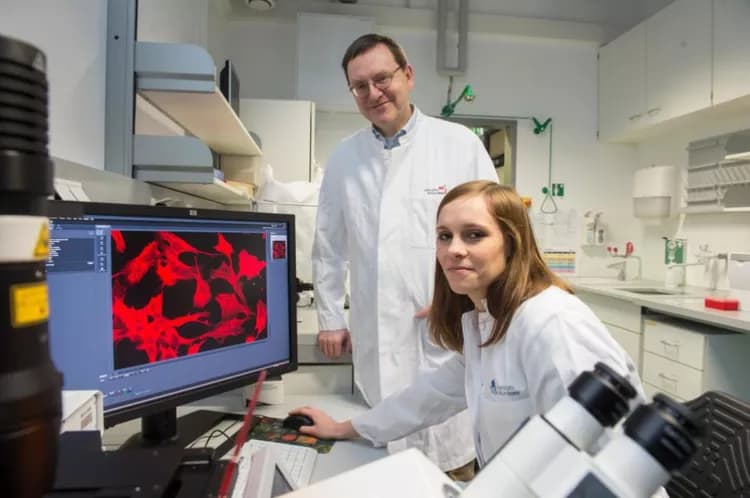The number of overweight people is increasing worldwide -- and thus the risk of developing diabetes or cardiovascular disease. For this reason, many dream of an active substance which would simply melt off fat deposits. An international team of scientists has now come one small step closer to this dream: The team discovered a switch in the fat cells of mice and humans with which excess pounds can be burned off. If the Gq protein is blocked, undesired white fat cells change into energy-consuming brown cells. The results are now being presented in the journal Nature Communications.
Significantly overweight people have a particularly large number of white fat cells but in contrast, they lack brown fat cells. The white cells are responsible for bothersome fat deposits; conversely, the brown cells "burn off" unwanted pounds by releasing the energy stored in them in the form of heat. Prof. Dr. Alexander Pfeifer from the Institute of Pharmacology and Toxicology at the University of Bonn has spent years researching how harmful white fat cells can be converted into desirable brown fat cells.
"We are looking for targets for new pharmaceutical products to one day be able to effectively combat obesity as the cause of numerous widespread diseases, such as diabetes or cardiovascular disease," says the scientist. If the researchers' dream comes true, brown fat cells could be boosted with yet-to-be-developed active substances such that rolls of fat could simply be melted off. "However, we still have a long way to go," says Prof. Pfeifer. His studies are still in the basic research stage.
There is a particularly high number of Gq proteins in brown fat cells
An international team of scientists working with Prof. Pfeifer, under the leadership of the University of Bonn, with colleagues from San Diego and Bethesda (both USA), Gothenburg (Sweden) and the Universities of Heidelberg and Leipzig, has discovered a "switch" in the fat cells of mice which can be used to accelerate fat burning. The researchers observed that there is a particularly high number of receptors in brown fat cells which bind to the Gq protein. The Gq protein performs an important function in information transfer.
The scientists activated the Gq protein in the mouse fat cells and as a result, the number and quality of the brown cells decreased. "On the other hand, if Gq is blocked with an inhibitor, more brown fat cells mature," says Ph.D. student Katarina Klepac from Prof. Pfeifer's team. The same applies to the beige fat cells on which the researchers are pinning their hopes. They can convert from white to brown fat cells and are also involved in "burning" excess energy stores. If the Gq protein is blocked in them, more brown "fat burners" form.
The conversion also works for human fat cells
Does the inhibition of the Gq proteins only work in mouse cells or also in human fat cells? The team of researchers conducted the experiments -- which had previously been performed on rodent cells -- also on human cells which they cultured in the laboratory. "Even in human fat cells, it was shown that brown fat cells can grow much better once Gq proteins were blocked," says Prof. Pfeifer.
According to the researcher, this could be a highly promising potential starting point for the development of active substances which boost fat burning in obese patients. "To date, there are no drugs which directly cause white fat cells to convert into brown fat cells," says Prof. Pfeifer. It will still be some time until suitable active substances are available on the market.
The above post is reprinted from materials provided by University of Bonn.Note: Materials may be edited for content and length.
Disclaimer: DoveMed is not responsible for the adapted accuracy of news releases posted to DoveMed by contributing universities and institutions.
Primary Resource:
Klepac, K., Kilić, A., Gnad, T., Brown, L. M., Herrmann, B., Wilderman, A., ... & Betz, M. J. (2016). The Gq signalling pathway inhibits brown and beige adipose tissue. Nature communications, 7.
Related Articles
Test Your Knowledge
Asked by users
Related Centers
Related Specialties
Related Physicians
Related Procedures
Related Resources
Join DoveHubs
and connect with fellow professionals


0 Comments
Please log in to post a comment.